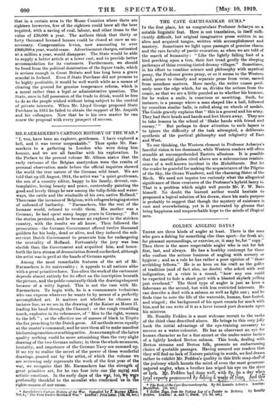THE CAVE GAURI-SANKAR GL'HA.*
IN the first place, let us congratulate. Professor Acharya on a notable linguistic feat. Here is not translation, in itself suffi- ciently difficult, but original imaginative prose written in an alien and acquired tongue, written with accomplishment and mastery. Sometimes we light upon passages of genuine charm and the rare faculty of poetic evocation, as when we are told of the march of humanity : "Like the lightly falling foot of a bird perching upon a tree, their feet tread gently the sleeping pathways of thine evening-tinted drowsy villages." Sometimes, in his effort to combine science and philosophy with mystical poesy, the Professor grows prosy, or so it seems to the Western mind, prone to classify and separate prose from verse, sacred from mundane matters. More rarely, the writer comes peril- ously near the edge which, for us, divides the serious from the comio, so that we are a little puzzled as to whether his humour, for he wakes a smile, is conscious or unwitting. Suoh, for instance, is a passage where a man shaped like a ball, followed by countless similar balls, is rolled along on wheels of medals. The Guide gravely explains that " this is a general and his army. They had their heads and hands and feet blown away. They are to take lessons in the school of ' Shake hands with friend and enemy.' " But perhaps to draw attention to such lapses is to ignore the difficulty of the task attempted, a deliberate synthesis of the poetical philosophy and religiosity of East and West.
To our thinking, the Western element in Professor Acharya's fanciful vision is too dominant, while Western readers will often stumble at uncomprehended Eastern allusions. It is possible that the martial globes cited above are a subconscious reminis- cence of a well-known incident in the Mahabharata. But let the reader be grateful for making the acquaintance of the Pilgrim of the Sky, the Ocean Wanderer, and the charming Sister of the Birch. We need not inquire too curiously what the allegorical significance of these creatures of the Professor's hybrid fancy is. That is a problem which might well puzzle Mr. F. W. Bain himself. No doubt the learned author would hesitate to propound a logical solution of his dream, since his main purpose is probably to suggest that though the mystery of existence is vast and overwhelming, yet is it penetrated by gleams that bring happiness and unquenchable hope to the minds of illogical men.






































 Previous page
Previous page